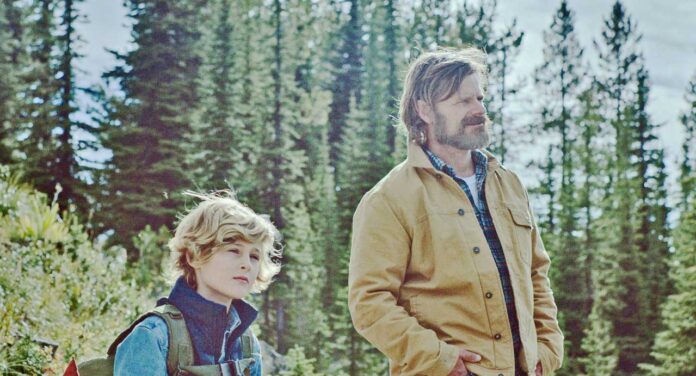The modest, engrossing drama, “Cowboys,” opens with Troy (Steve Zahn) and his preteen son, Joe (Sasha Knight) out in the Montana wilderness appreciating the magnificent mountain landscape. This scene could easily be a memorable moment in a father/son camping trip — except that it is not. As writer/director Anna Kerrigan’s compassionate film reveals, Troy and Joe are outlaws, and Joe is transgender.
“Cowboys,” available in virtual cinemas and VOD on February 12, toggles back and forth in time between Troy and Joe’s trip and the events that preceded father and son going on the run. Troy and his wife Sally (Jillian Bell) are struggling to raise Joe because Troy is accepting of his son’s desire to present as male, while Sally still insists her little girl Joe should wear dresses and play with dolls.
There are some poignant scenes of Joe admiring men in denim and with silver belt buckles at a bowling alley, a look he replicates in mirrors, at home, school, and even a clothing store’s fitting room. And there is a tender exchange between Troy and Joe when the child explains his gender dysphoria to his father. In contrast, Sally refuses to acknowledge Joe’s gender identity, calling him “her,” and hoping to get Joe “back to normal.” One of the more insidious moments has Sally trying to encourage Joe to deny who he is and follow “God’s game plan.”
Sally may be painted as the villain of the piece, and she even misleads Detective Faith Erickson (Ann Dowd), who is assigned to the abduction case, by giving the policewoman a photograph of Joe as a girl. But it is Troy’s behavior that is under scrutiny. He suffers from mental illness and takes medication to combat his mania. Moreover, his kidnapping of Joe is his second criminal offense. He did a stretch of time following an altercation with his brother-in-law Jerry (Chris Coy).
Kerrigan’s film may stack the deck against the underdog Troy, but that only makes viewers root for him to succeed — despite the uphill battle he faces. Troy is admirable because he understands his son and loves and accepts him unconditionally. He also recognizes that Joe’s situation at home with his mom is becoming increasingly untenable. His criminal record prevents him from getting custody, but Sally allows Troy see Joe, even though, she maintains, “she doesn’t have to.” The film nicely conveys the love between Troy and Sally and how it has ebbed and flowed over time.
“Cowboys” provides Zahn with a fine showcase, and his thoughtful performance won him the Best Actor prize at last year’s Tribeca Film Festival. (Kerrigan also was honored for her screenplay). Zahn deftly calibrates Troy’s mania. When he excitedly wakes up Joe to head toward Canada, his expression slips, and he exposes the very real fear he has been masking all along. How can he safeguard Joe, when he is also endangering him?
Several intense episodes show Troy in protective, papa-bear mode — rescuing Joe in a river at night or responding to a gunshot in the woods. These scenes are contrasted with Troy’s comic moments with his son, such as indulging Joe in a bedtime story, or acting goofily while out camping. The father/son bonding is what makes “Cowboys” so heartfelt. The love Troy has for Joe has nothing to do with his gender; Joe’s self-worth and safety is of the utmost importance and concern.
“Cowboys” also benefits from Sasha Knight — who identifies as trans or non-binary — giving an unselfconscious performance as Joe. The young actor obviously understands the complexity of his character and handles his “coming out” scene well. He is impassioned when he tells his father that he doesn’t want to wear dresses, that he is not a tomboy, nor is he confused about his gender. Knight never makes Joe cloying or a cliché. When Joe makes a bad decision, viewers will empathize with him.
Kerrigan does emphasize gender roles throughout her film, and these moments are occasionally contrived. Sally accuses Troy of “messing Joe up” by modeling masculine/cowboy images. And a scene where Sally refuses to buy Joe a gun, a slingshot, or a cowboy book, offering a doll instead, is too on the nose — as is a later scene when Sally returns to the store. But a key scene of Joe cutting his long curly hair in defiance is as liberating as it is symbolic.
“Cowboys” runs a brisk 83-minutes. It does not bask enough in the beautiful western scenery (a minor complaint). Nor does it delve too deeply into its central issues, which is fine; they merely provide a framework for the involving story. But the scenes of Detective Erickson are terrific, and it is fun to watch Dowd’s exasperation at the incompetency she encounters.
Kerrigan’s film is worthwhile and puts a queer spin on a familiar Western tale of pursuit.
